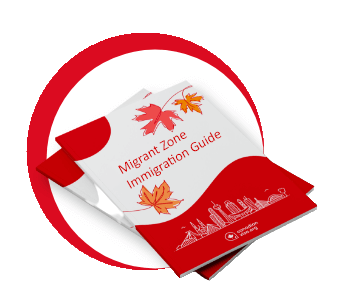
Thinking about living in Canada? By now, you may have heard about all the wonders and opportunities this country has to offer. But does the second-largest country in the world live up to all the hype? Well, the proof is in the poutine, and with one of the highest naturalization rates in the world, it's clear that most newcomers are happy with their decision to move to Canada.
While the Great White North is an immigrant's dream, with all the benefits of moving here, it is important to be realistic and maintain an open mind when you move to Canada. No place is all moonshine and roses! So let's look at the pros and cons of living in Canada.
The Weather in Canada

Pros
If you immigrate to Canada from a country where snow is only something you've seen on television, you're in for a real winter wonderland treat! You'll find some of the most diverse weather patterns in Canada. Think of the most extreme, icy winter, muggy summers, tornados, snowstorms and occasional drought - the works really!
Prepare to be immersed in the snow - for months. You can finally have those snowball fights you've seen in movies, take up skiing or snowboarding, skate on frozen lakes and build a snowman. And you'll have an excuse to shop for a full-on winter wardrobe - snow boots and all! Once you're all kitted, you can swing by your local Tim Hortons for a delicious cup of hot chocolate.
Cons
You'll need time to adapt to the country's extreme weather conditions. You may head out on days where the weather seems perfectly normal, only to return to an icy setting. Winter temperatures can drop to -20 degrees in certain regions, while summer can reach 30 degrees. This is why Canadians are always prepared. They wear several layers they can peel off or add to.
Top tip: Always carry an umbrella and download a weather app for regular updates.
Safety in Canada

Pros
You'll be pleased to know that the country is recognized as one of the safest countries in the world, ranking at number 12 on the Global Peace Index. Safety plays a huge role in the quality of life of newcomers. So when determining whether Canada is a safe country to live in, consider things like the crime rate, gun control, worker health and safety, housing, healthcare and transport. Do some research on these factors before you leap. Here's a summary:
- The crime rate: Canada's crime rate is low compared to other parts of the world, especially the US.
- Gun control: The country has stringent gun control measures, including a national freeze on the sale, purchase, and transfer of handguns.
- Worker health and safety: Canada takes worker health and safety seriously. The country ensures multiple measures are in place to protect workers at work. This includes efforts to ensure that workers are not exploited.
- Housing: Most Canadians have access to affordable housing. In 2021 there was a federal budget allocation of roughly $2,5 billion towards affordable housing.
- Healthcare: Canadian citizens and permanent residents have access to healthcare.
- Transport: Canada has a safe and reliable public transport system.
Cons
While the country is considered one of the safest in the world, it has its fair share of crimes. According to the latest crime statistics, there was a 5% increase in violent crimes in 2021. Non-violent crimes, such as property and drug offenses, decreased by 3%.
Healthcare in Canada

Pros
Canada has one of the best healthcare systems in the world. This is due to its universal healthcare system, Medicare. The Government of Canada believes that every person has a right to equal and exceptional healthcare. All Canadian citizens and permanent residents, therefore, have access to this. The system is funded through taxes. The government also allocates much of its annual Gross Domestic Product (GDP) to healthcare.
Cons
Universal healthcare is only for Canadian citizens and permanent residents. As a foreign national, depending on your province, you will have to seek private medical care while you wait to become a permanent resident. Here are a couple of healthcare companies to consider.
There is also a waiting period of up to three months in some provinces for your public health insurance to kick in. You must ensure that you have private health insurance to cover your healthcare needs while you wait.
As a newcomer to Canada, you will have a 3-month waiting period before applying for your public health insurance card in Canada and accessing any free healthcare services. For this reason, getting private health insurance during this interim period is essential.
NOTE: Canada's universal health care only covers medically necessary healthcare. If you need an operation, you'll be covered, but for other things like braces or prescription glasses, you'll have to fork out the cash yourself or get private health insurance to cover the gaps that Medicare doesn't.
Your Credit Score as an Immigrant in Canada

Pros
If your credit score is bad in your home country, the good news is that you can start on a clean slate in the Great White North. When you get to Canada, you’ll find that major banks have several newcomer packages available, which include a credit card with access to bank loans.
Cons
When you move to Canada, you leave your credit history behind in your country of origin. This can be inconvenient if you’ve worked hard to build a good credit score. You will need it to get a credit card or rent a property. Quite inconvenient if you’ve built up a good credit score and would like to invest in property.
Discovering Canada

Pros
With a total area of 9,984,670 km2, Canada has much to discover, so you'll want to explore as a newcomer. This land of maple leaves is a traveler's dream with an almost enchanting natural environment such as Banff National Park, Rocky Mountains, Niagara Falls), old European charm, historical sites and other attractions.
Cons
You'll need an extensive travel budget if you plan to wander through the length and breadth of the country regularly. Domestic flights are quite a costly affair. This is largely due to a lack of competition for airline companies.
Weighing up the Pros and Cons of Living in Canada
When weighing up the pros and cons of living in Canada, it's clear that the pros greatly outweigh the cons. Unsurprisingly, this Northern wonderland is considered a top immigration destination.
If your mind's made up about a move to Canada, our team of Regulated Canadian Immigration Consultants (RCICs) are standing by to guide you through the over 100 immigration and visa options available.
FAQS
Which Programs Will Lead to Canadian Permanent Residency Quite Quickly?
The fastest way to get Canadian permanent residency is by applying via the Express Entry System or the country's Provincial Nominee Program.
Is it Quite Expensive to Live in Canada?
The cost of living in Canada is relatively low, but this also depends on the province and city you plan to settle in. According to Numbeo, a family of four can spend around $4,432.80 (rent not included) on living expenses.
Are Canadians Welcoming to Immigrants?
As one of the friendliest nations in the world, you'll find Canadians welcome foreigners and accept all cultures.





